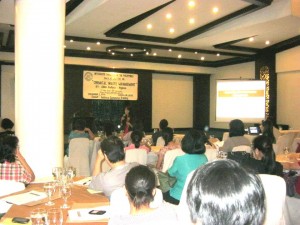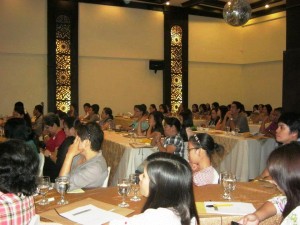For the PRC memorandum, click HERE.
To download the nomination form, click HERE.
The Chemistry profession is regulated by the PRC through the Board of Chemistry. The Board of Chemistry has three (3) members and nominations are being invited for members of the Board.
For the list of complete requirements, click HERE to download the file.
Deadline of submission of entries is on 2 April 2013 (Tuesday).
The newly-reorganized ICP-Bacolod Chapter marked its re-inauguration with a Seminar on Chemical Waste Management which was held at Sugarland Hotel, Bacolod City, last December 7, 2012. ICP-Bacolod was formerly known as ICP-Negros.

The guest resource speaker for the seminar was Ms. Edna C. Mijares, Vice President of ICP-National and President and CEO of JEFCOR Laboratories. The seminar attracted a big audience from industry (sugarmills, distilleries, bottling plants, and others), academe, research institutions, hospitals, clinical labs and government agencies.

The highlight of the event was the induction of the 2013 officers: President: Roselyn C. Usero, Negros Prawn Producers Cooperative Analytical and Diagnostic Laboratory; Vice-president: Dida V. Gatanela, Sugar Regulatory Administration; Secretary: Mildred P. Bermejo, University of Negros Occidental Recoletos; Treasurer: Glenda S. Buendia, SRA; Board of Directors: Melinda M. Montaño, UNO-R; Leilani L. Crucero and Charity Huna B. Fabon, University of St. La Salle; Russell Guacena, Distileria Bago; Grace Tantengco, Aldrzt Corp; Ma. Elisa A. Alvarez, Coca-Cola Bottlers Phils., Inc.; Arlene C. Matti, SRA-Bacolod; Leo D. Pacalda, First Farmers Milling Corp.; and Mary Jonie O. Villanueva, West Negros University.

The event, which was sponsored by Molave Trading, was the perfect venue for rekindling the ties between ICP-Bacolod and ICP-National. The new set of officers expressed their commitment to give their full support and participation in the plans and programs of ICP-National.
ICP-Bacolod looks forward to more activities next year to boost the morale of not only licensed chemists but associate members as well to make ICP-Bacolod active again, productive and sustainable.
Another challenge for ICP-Bacolod is to produce more chemists in Negros and to revive hope as the organization continues to believe that the Chemistry profession will make a radical recovery back to the level where it once was.
The Integrated Chemists of the Philippines held its second in the series of GHS Awareness activities by conducting the Advanced GHS Training last November 27-29, 2012, at the Makati Palace Hotel in Makati City.
This advanced training for the Globally Harmonized System of Classification and Labelling of Chemicals (GHS) was intended for all of those who are involved in chemical safety in the laboratory both academe and industry, research , production, transport and public health. The participants included those who completed the Basic GHS Training or had attended seminar on GHS Overview.
The objectives of the Advanced GHS Training were: to familiarize participants with the GHS criteria for classifying physical, health and environmental hazards; to learn the elements of hazard communication; and to practice application of hazard criteria to sample chemicals and to determine which GHS hazard communication elements apply.
The course was divided into four parts. Part 1 was the Introduction to Hazard Classification and Hazard Communication where the steps and guidelines on how to classify and communicate the hazards were discussed. Part 2 was about Physical Hazard Criteria, where the 16 classes of physical hazards were defined and characterized and the criteria for determining the categories, i.e., the severity, of each hazard class are discussed. At the end of the presentation participants were divided into 7 groups and given set of exercises to answer. Each group presented the process of how they arrived at the answers. Part 3 presented Health Hazard Criteria where the basis for classifying the ten (10) health hazard classes and their categories were explained. Similar to Part 1, a set of exercises were also provided where each group was asked to answer and present their reasons for their classification. Part 4 covered Environmental Hazard Criteria, where the basis for classifying the class of hazard and the categories were discussed. At the end of this presentation, a workshop was conducted to solve a set of exercises which was given to each group. Presentors from each group were asked to discuss and explain their answers.
The three-day training was concluded with the awarding certificates to the participations by the trainers, Ms. Tessie B. Corpuz and Ms. Marila Palisoc.
By Ms. Mutya Samonte
It was in 2008 when the ICP held its first seminar on Chemical Laboratory Waste Management. As a result of this seminar, a number of laboratories initiated changes in their chemical waste management practices.
Two participants from first seminar have now come full circle and were speakers in the second seminar, entitled “Practical and Cost Effective Solutions to Laboratory Chemical Wastes, part II”, which was held on October 24-25, 2012, at MetroClub, Makati.
Two of invited speakers who presented their respective programs and insights were Mr. Joel Ballesteros, PCO for UP Diliman Institute of Chemistry, and Ms. Lilia Molina, Head of the Analytical Services Laboratory at IRRI.
Other speakers included Engr. Edwin Navaluna, Supervising Environmental Specialist of DENR-EMB and Dr. Veronica Migo, Head of the Central Analytical Services Laboratory of Biotech, UP Los Baños, shared the process for Hazardous Chemical Identification and the relevant laws applying to chemical waste management.
Ms. Tess Cayton, former plant Manager for Bayer Crop Science and now a private Environmental Consultant, presented an overview of the best practices on chemical waste disposal as practiced at Bayer (Philippines), to comply with local regulations and national laws, in particular with respect to pesticides.
Dr. Luerne De Sales, General Manager of All Wastes Services, Inc. (formerly Inchem) showed how chemical wastes are treated in their facilities and Mr. Mark Castillo, an Applications Specialist of Merck Millipore, provided a review of innovations in chemical waste management.
The seminar was capped by a workshop which involved exercise on how to identify, estimate and classify chemical wastes based on procedures from laboratory exercises and analytical methods.
The main coordinator and lively emcee for this seminar was Ms. Edna Mijares and the workshop exercises were developed by Dr. Fabian Dayrit.
The 118 participants from government, academe, and industry were able to take home valuable information and skills. Many were inspired to start and improve on their lab waste management process.
The two-day seminar was well worth the wait. The ICP plans to bring the seminar to the regions in the near future.